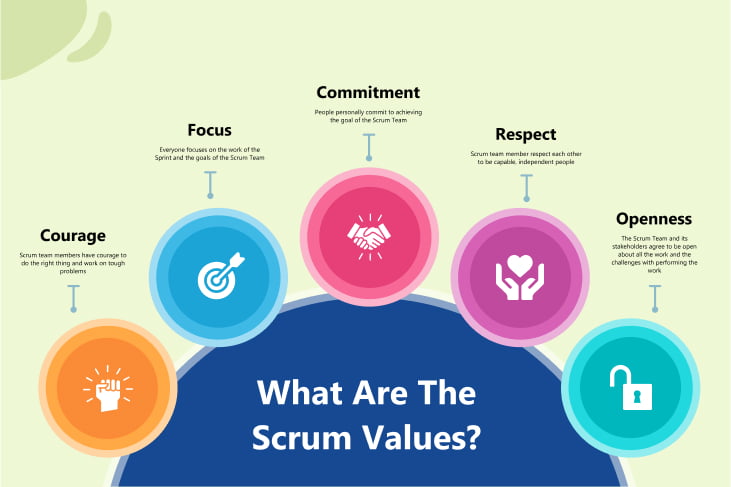You must know that Scrum is one of the best project management methodologies available today. Scrum team members adhere to Scrum values, which are similar to corporate or organizational principles. These principles provide the cornerstone around which the Scrum methodology is constructed.
What are the scrum values?
Scrum values are kind of rules set for developing projects using Scrum methodology. In short, it involves the interaction between teams and the stakeholders. These values include Courage, Commitment, Focus, Openness and Respect.
Thus, these values guide Scrum teams in their interactions, decision-making processes, and ways of working, helping them to foster a culture of trust, accountability, and continuous improvement.
Furthermore, by embodying these values, Scrum teams can better navigate the complexities of software development and deliver valuable products that meet the needs of their customers.
Which are the 5 scrum values?

Commitment
The emphasis of commitment is on how committed people and teams are to realizing the project’s objectives. It means setting and keeping reasonable goals and completing them.
In Scrum, commitment entails producing excellent work that enhances the final result in addition to meeting deadlines. Furthermore, the team as a whole commits to reaching the sprint objective, and team members commit to finishing the tasks they have decided upon during the sprint planning. This dedication promotes responsibility and propels the group towards accomplishment.
Courage
Having the guts to take on obstacles, face problems, and make difficult choices in the pursuit of project objectives is what it means to be courageous. It promotes openness and a readiness to confront problems head-on.
Courage may take many different forms in Scrum values, including speaking out during the sprint about issues or obstacles, owning up to mistakes, asking for feedback, and accepting change. Thus, teams that are encouraged to be courageous are better able to overcome challenges and adjust to changing needs and situations.
Focus
Focus highlights how important it is to concentrate energy on the most important tasks and goals. To optimize productivity and accomplish intended results, it is required to set focus. Thus, with distraction minimization, a team can concentrate on finishing the work.
Furthermore, Scrum prioritizes tasks based on well-defined goals, efficient time management, and unambiguous targets. Without becoming distracted by irrelevant chores or distractions, the team concentrates on finishing the work that has been agreed upon in the sprint backlog throughout the sprint. With this concentration, the team makes sure to regularly and effectively provide useful work increments.
Openness
This value promotes honesty, communication, and openness between the team and the stakeholders. It entails a transparent and beneficial exchange of knowledge, suggestions, and ideas.
Transparency is crucial in Scrum to promote cooperation, trust, and ongoing development. During meetings like daily scrum, sprint review, and sprint retrospective, team members are encouraged to voice their thoughts, voice concerns, and offer feedback. Teams that foster transparency are better able to see problems early on, take swift action to resolve them, improve communication, and build bonds.
Respect
It places a strong emphasis on treating others with care, compassion, and professionalism. It entails appreciating the many viewpoints, recognizing each person’s unique contribution, and creating a welcoming atmosphere.
Respect is essential to Scrum because it helps to establish cooperation, trust, and a healthy team culture. Members of the team provide a secure environment for idea exchange and productive collaboration by respecting each other’s knowledge, viewpoints, and limits. Teams may maximize the creativity and collective intelligence of their members and succeed more by fostering a respectful culture.
Conclusion
In conclusion, the five Scrum values are commitment, courage, focus, openness, and respect. They act as a framework for Scrum teams influencing their dynamics at work and how they engage with one another.
Teams that uphold these principles foster trust, responsibility, and ongoing development with the stakeholders. This eventually facilitates the productive delivery of high-quality products and services. Scrum teams may effectively, cooperatively, and clearly traverse the difficulties of project management by adhering to these ideals.

